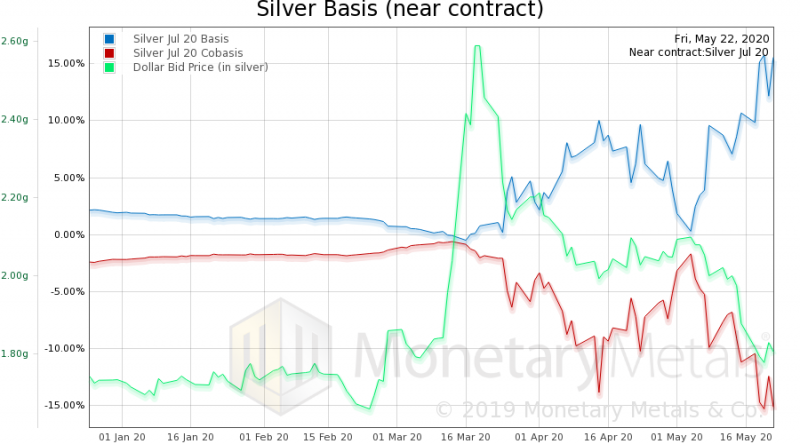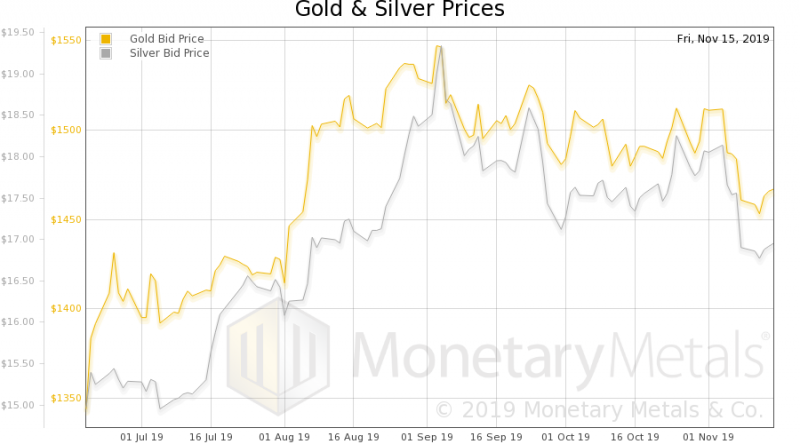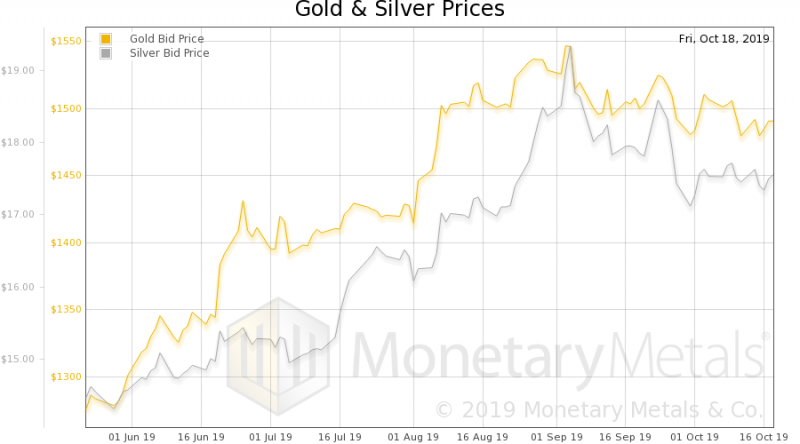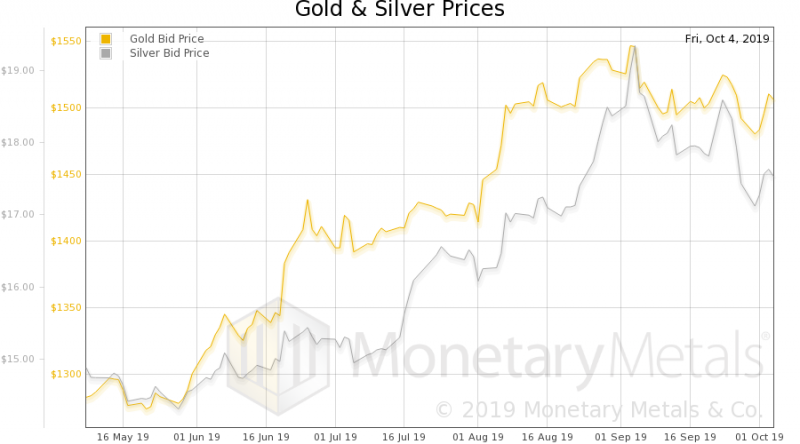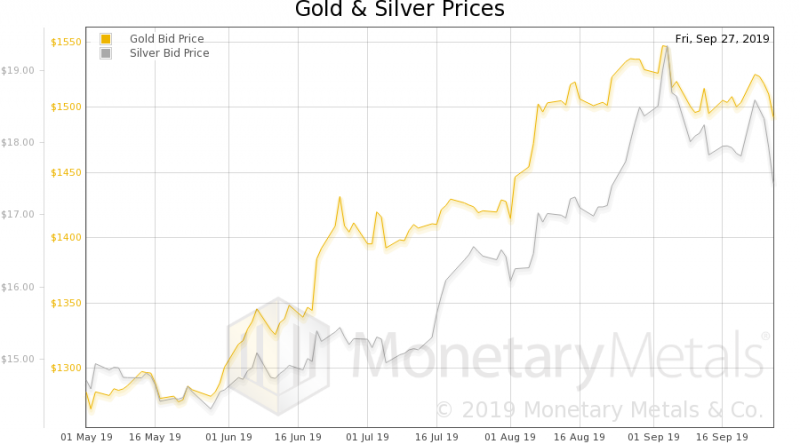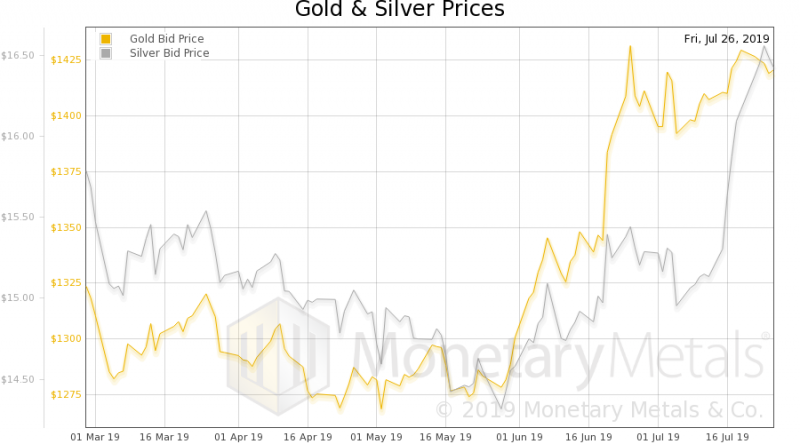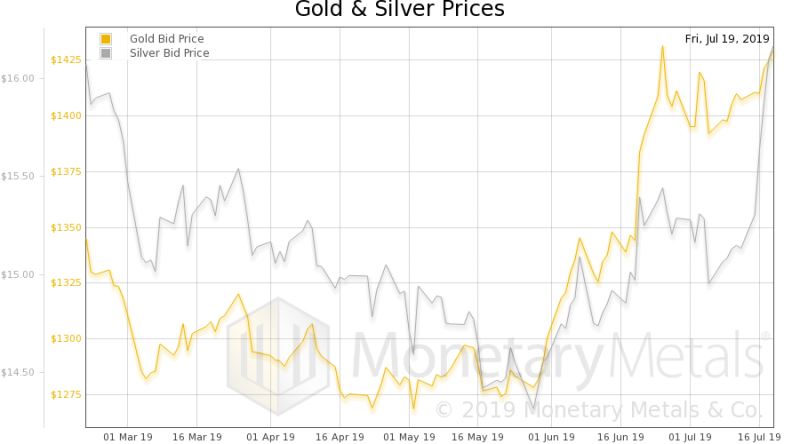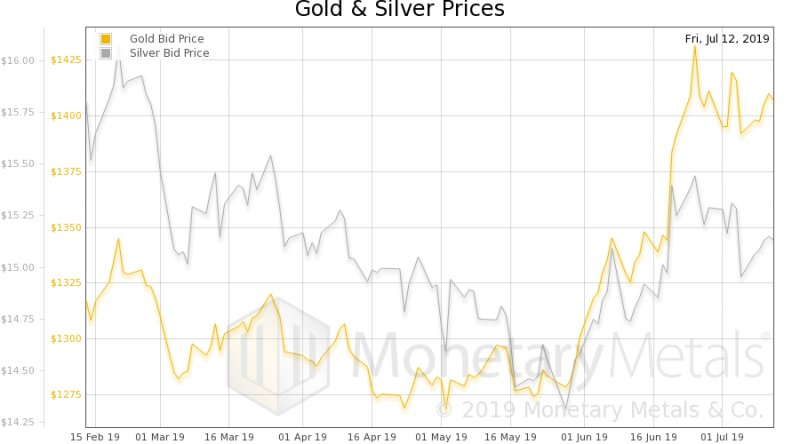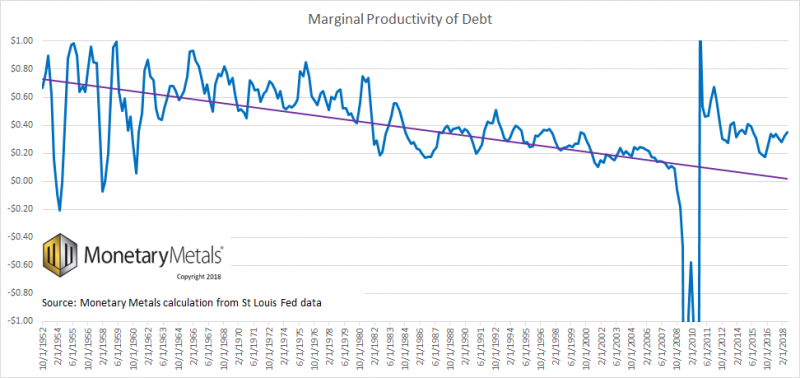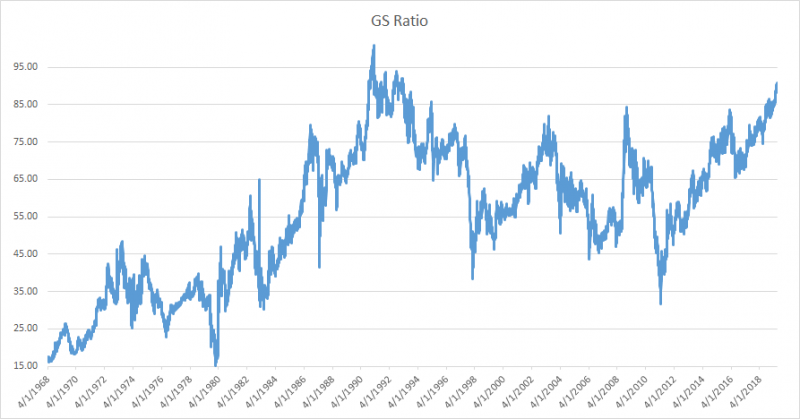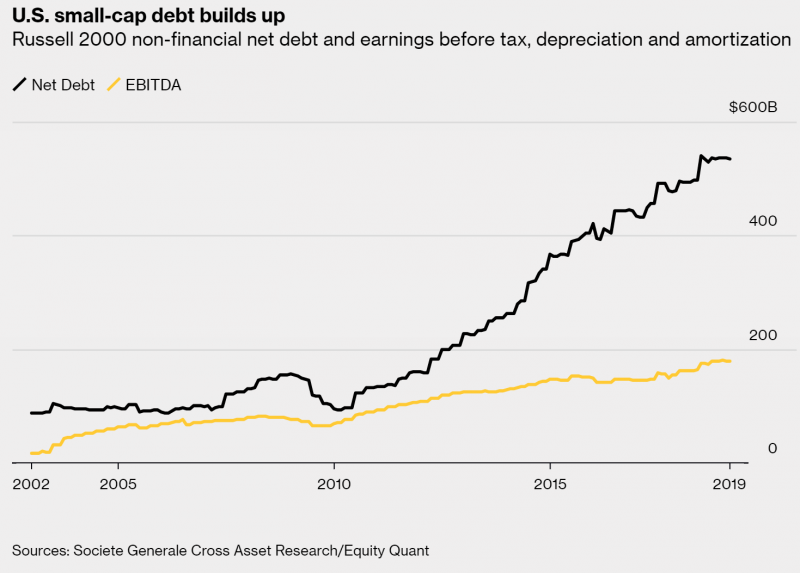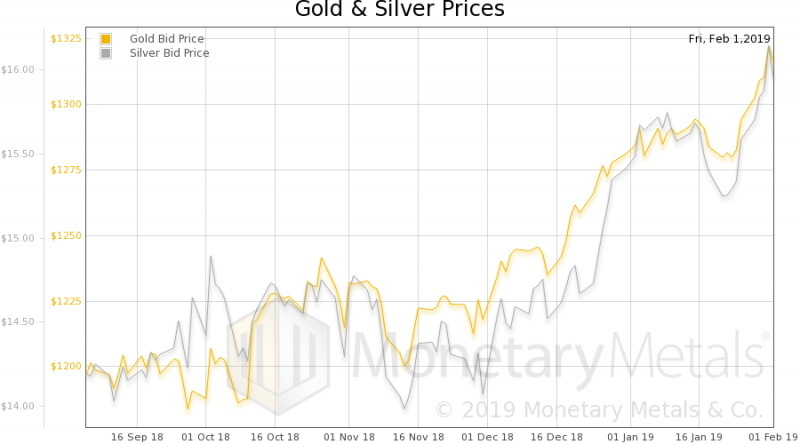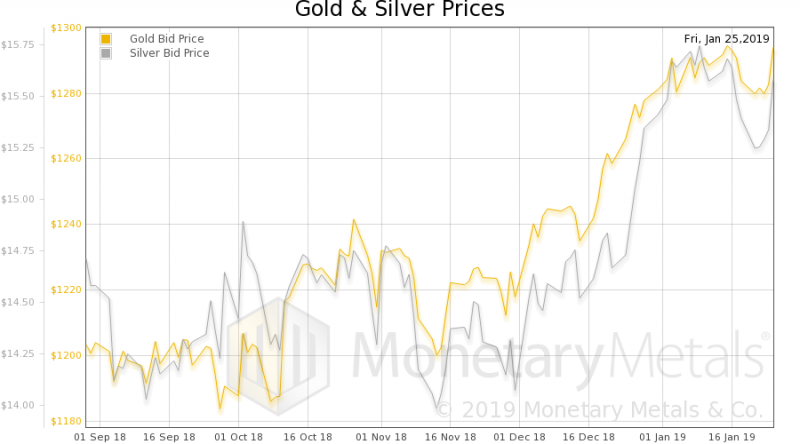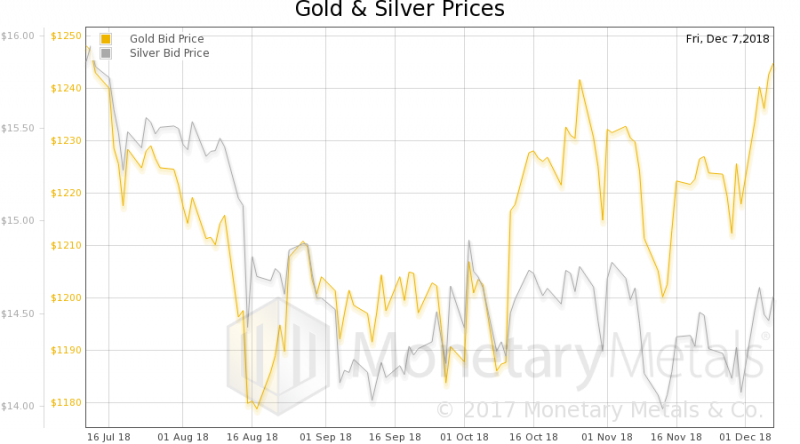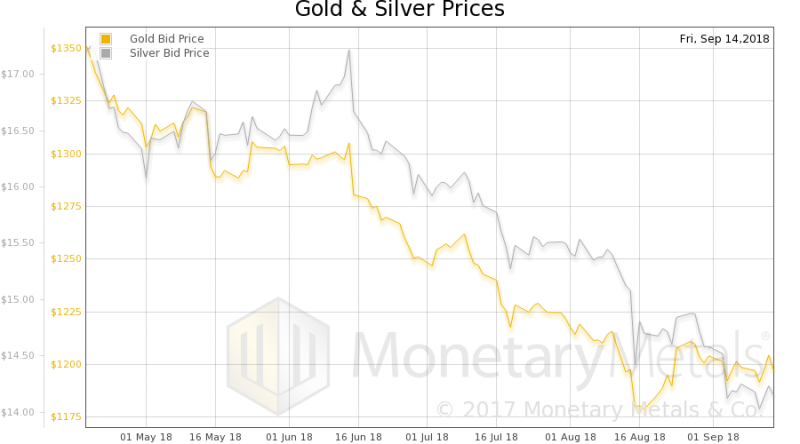Tag Archive: capital consumption
When Is a Capital Gain Capital Consumption? Market Report, 25 May
The price of gold dropped a few bucks this week, but the price of silver jumped about half a buck. The drumbeat for the gold bull market is well underway, and it is beginning now for silver. So let’s do a quick update on the supply and demand fundamentals.
Read More »
Read More »
It’s Only Paper, Market Report 27 Apr
The response to the virus has added a new mechanism of capital consumption to the many we have documented over the years. Businesses are shut down, yet they continue to incur expenses. There is a popular misconception out there that this is merely a paper loss. One can almost picture a neutron bomb that somehow wipes out only paper, leaving all the physical assets and plant unscathed.
Read More »
Read More »
The End of an Epoch, Report 8 Dec
“There is no subtler, no surer means of overturning the existing basis of society than to debauch the currency. The process engages all the hidden forces of economic law on the side of destruction, and does it in a manner which not one man in a million is able to diagnose.”
Read More »
Read More »
The Perversity of Negative Interest, Report 17 Nov
Today, we want to say two things about negative interest rates. The first is really simple. Anyone who believes in a theory of interest that says “the savers demand interest to compensate for inflation” needs to ask if this explains negative interest in Switzerland, Europe, and other countries. If not, then we need a new theory (Keith just presented his theory at the Austrian Economics conference at King Juan Carlos University in Madrid—it is...
Read More »
Read More »
Wealth Accumulation Is Becoming Impossible, Report 20 Oct
We talk a lot about the falling interest rate, the too-low interest rate, the near-zero interest rate, the zero interest rate, and the negative interest rate. Hat Tip to Switzerland, where Credit Suisse is now going to pay depositors -0.85%. That is, if you lend your francs to this bank, they take some of them every year. Almost 1% of them.
Read More »
Read More »
A Wealth Tax Consumes Capital, Report 6 Oct
It seems one cannot make a name for one’s self on the Left, unless one has a proposal to tax wealth. Academics like Tomas Piketty have proposed it. And now the Democratic candidates for president in the US propose it too, while Jeremy Corbyn proposes it in the UK. Venezuela finally added a wealth tax in July.
Read More »
Read More »
The Purchasing Power of Capital, Report 29 Sep
We discuss capital consumption all the time, because it is the megatrend of our era. However, capital consumption is an abstract idea. So let’s consider some concrete examples, to help make it clearer. First, let’s look at the case of Timothy Housetrader. Tim has a small two-bedroom house. Next door, his neighbor Ian Idjit, owns a four-bedroom house which is twice the size.
Read More »
Read More »
Obvious Capital Consumption, Report 28 Jul
We have spilled many electrons on the topic of capital consumption. Still, this is a very abstract topic and we think many people still struggle to picture what it means. Thus, the inspiration for this week’s essay. Suppose a young man, Early Enterprise, inherits a car from his grandfather. Early decides to drive for Uber to earn a living. Being enterprising, he is up at dawn and drives all day.
Read More »
Read More »
The Fake Economy, Report 21 Jul
Folks in the liberty movement often say that the economy is fake. But this does not persuade anyone. It’s just preaching to the choir! We hope that this series on GDP provides more effective ammunition to argue with the Left-Right-Wall-Street-Main-Street-Capitalists-Socialists.
Read More »
Read More »
How to Fix GDP, Report 14 Jul
Last week, we looked at the idea of a national balance sheet, as a better way to measure the economy than GDP (which is production + destruction). The national balance sheet would take into account both assets and liabilities. If we take on another $1,000,000 debt to buy a $1,000,000 asset, then we have not added any equity.
Read More »
Read More »
More Squeeze, Less Juice, Report 7 Jul
We have been writing on the flaws in GDP: that it is no measure of the economy, because it looks only at cash and not the balance sheet, and that there are positive feedback loops.
“OK, Mr. Smarty Pants,” you’re thinking (yes, we know you’re thinking this), “if GDP is not a good measure of the economy, then what is?!”
Read More »
Read More »
What Gets Measures Gets Improved, Report 23 June
Let’s start with Frederic Bastiat’s 170-year old parable of the broken window. A shopkeeper has a broken window. The shopkeeper is, of course, upset at the loss of six francs (0.06oz gold, or about $75). Bastiat discusses a then-popular facile argument: the glass guy is making money (to which all we can say is, “plus ça change, plus c’est la même chose”).
Read More »
Read More »
Debt and Profit in Russell 2000 Firms
This week, the Supply and Demand Report featured a graph of debt vs profitability in the Russell 2000. Here’s the graph again: This graph shows a theme that we, and practically no one else(!) have been discussing for years. It is the diminishing marginal utility of debt. In this case, more and more debt is required to add what looks like less and less profit (we don’t have the raw data, only the graphic).
Read More »
Read More »
Is Capital Creation Beating Capital Consumption? Report 3 Mar
We have written numerous articles about capital consumption. Our monetary system has a falling interest rate, which causes both capital churn and conversion of one party’s wealth into another’s income. It also has too-low interest, which encourages borrowing to consume (which, as everyone knows, adds to Gross Domestic Product—GDP).
Read More »
Read More »
Who Knows the Right Interest Rate, Report 3 Feb 2019
On January 6, we wrote the Surest Way to Overthrow Capitalism. We said: “In a future article, we will expand on why these two statements are true principles: (1) there is no way a central planner could set the right rate, even if he knew and (2) only a free market can know the right rate.” Today’s article is part I that promised article.
Read More »
Read More »
Modern Monetary Theory: A Cargo Cult, Report 20 Jan 2019
Newly elected Representative Alexandria Ocasio-Cortez recently said that Modern Monetary Theory (MMT) absolutely needed to be “a larger part of our conversation.” Her comment shines a spotlight on MMT. So what is it? According to Wikipedia, it is: “a macroeconomic theory that describes the currency as a public monopoly and unemployment as the evidence that a currency monopolist is restricting the supply of the financial assets needed to pay taxes...
Read More »
Read More »
The Prodigal Parent, Report 9 Dec 2018
The Baby Boom generation may be the first generation to leave less to their children than they inherited. Or to leave nothing at all. We hear lots—often from Baby Boomers—about the propensities of their children’s generation. The millennials don’t have good jobs, don’t save, don’t buy houses in the same proportions as their parents, etc.
Read More »
Read More »
The Toxic Stew, Report 7 Oct 2018
Last week, we shined a spotlight on a crack in the monetary system that few people outside of Switzerland (and not many inside either) were aware of. There is permanent gold backwardation measured in Swiss francs. Everyone knows that the Swiss franc has a negative interest rate, but so far as we know, Keith is the only one who predicted this would lead to its collapse (and he was quite early, having written that in January 2015).
Read More »
Read More »
Why Are Wages So Low, Report 23 Sep 2018
Last week, we talked about the capital consumed by Netflix—$8 billion to produce 700 shows. They’re spending more than two thirds of their gross revenue generating content. And this content has so little value, that a quarter of their audience would stop watching if Netflix adds ads (sorry, we couldn’t resist a little fun with the English language).
Read More »
Read More »
Never Mind the Bollocks, Here’s the Avocado Toast, Report 16 Sep 2018
For about ten bucks a month, Netflix will give you all the movies you can watch, plus tons of TV show series and other programs, such as one-off science documentaries. They don’t offer all movies, merely more than you can watch. Oh, and there are no commercials. They don’t just give you old BBC reruns, which you know they can get for a pittance.
Read More »
Read More »
Donate to SNBCHF.com
Donate to SNBCHF.com Via Paypal or Bitcoin To Help Keep the Site Running
Please consider making a small donation to Snbchf.com. Thanks
Bitcoin wallet: bc1qa2h6hgd0xkuh7xh02jm5x25k6x8g7548ffaj3j
Receive a Daily Mail from this Blog
Live Currency Cross Rates
 On Swiss National Bank
On Swiss National Bank
-
USD/CHF stays above 0.9100 nearing the highs since October
11 days ago -
SNB Sight Deposits: increased by 3.4 billion francs compared to the previous week
14 hours ago -
Pound Sterling falls back as upbeat US Retail Sales strengthen US Dollar
11 days ago -
Canadian Dollar remains vulnerable after strong US Retail Sales
11 days ago -
2024-04-09 – Martin Schlegel: Interest rates and foreign exchange interventions: Achieving price stability in challenging times
17 days ago
 Main SNB Background Info
Main SNB Background Info
-
SNB Sight Deposits: increased by 3.4 billion francs compared to the previous week
14 hours ago -
The Secret History Of The Banking Crisis
2017-08-14 -
SNB Balance Sheet Now Over 100 percent GDP
2016-08-29 -
The relationship between CHF and gold
2016-07-23 -
CHF Price Movements: Correlations between CHF and the German Economy
2016-07-22
Featured and recent
-
Did the MMT Camp Correctly Predict the Post-Covid Economy?
-
Word of the Day: Performative
-
 In diesen Städten sind die #Mieten am stärksten gestiegen #wohnen #shorts
In diesen Städten sind die #Mieten am stärksten gestiegen #wohnen #shorts -
 5 Entscheidungen, von denen Dein Wohlstand abhängt
5 Entscheidungen, von denen Dein Wohlstand abhängt -
Chapter 9. From Taxes to Trade, More Secession Means More Freedom
-
Woods Exposes the Federal Reserve System
-
Increase of 1.7% in nominal wages in 2023 and 0.4% decline in real wages
-
 SNB returns to quarterly profit thanks to Swiss franc weakness
SNB returns to quarterly profit thanks to Swiss franc weakness -
The Danger of the West’s Neglect of Individual Rights
-
The Problem with Microlibertarianism
More from this category
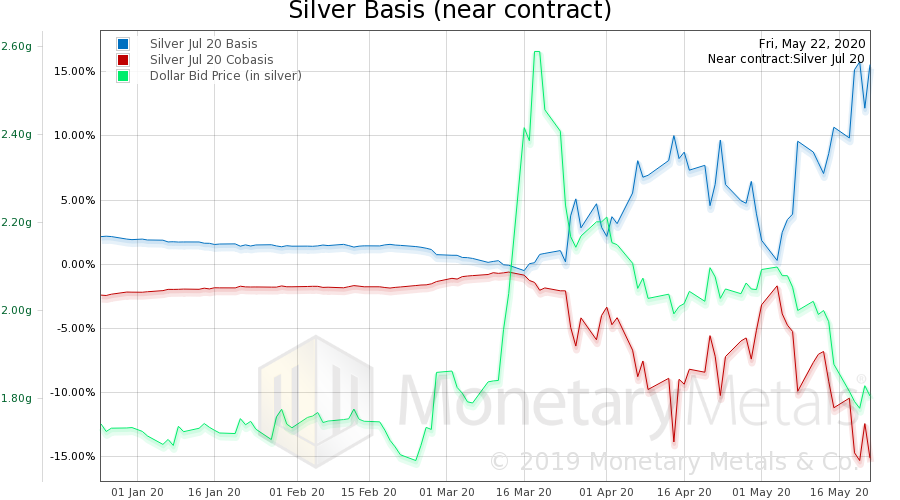 When Is a Capital Gain Capital Consumption? Market Report, 25 May
When Is a Capital Gain Capital Consumption? Market Report, 25 May26 May 2020
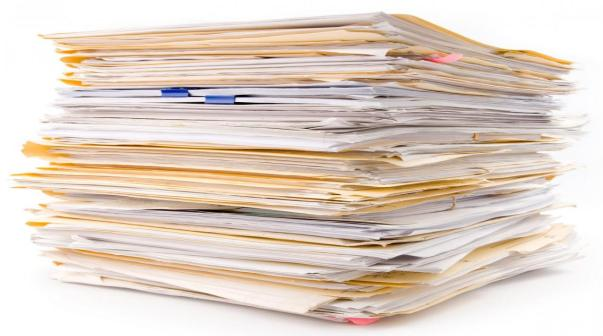 It’s Only Paper, Market Report 27 Apr
It’s Only Paper, Market Report 27 Apr28 Apr 2020
 The End of an Epoch, Report 8 Dec
The End of an Epoch, Report 8 Dec10 Dec 2019
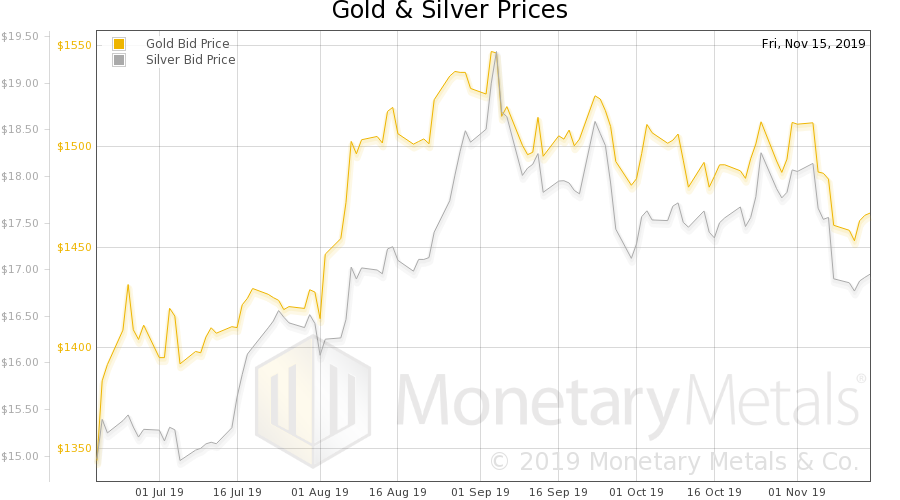 The Perversity of Negative Interest, Report 17 Nov
The Perversity of Negative Interest, Report 17 Nov18 Nov 2019
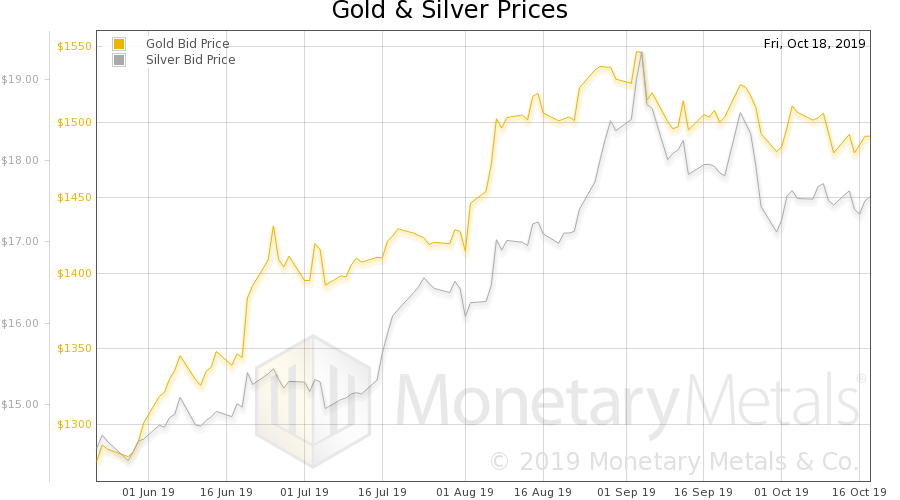 Wealth Accumulation Is Becoming Impossible, Report 20 Oct
Wealth Accumulation Is Becoming Impossible, Report 20 Oct22 Oct 2019
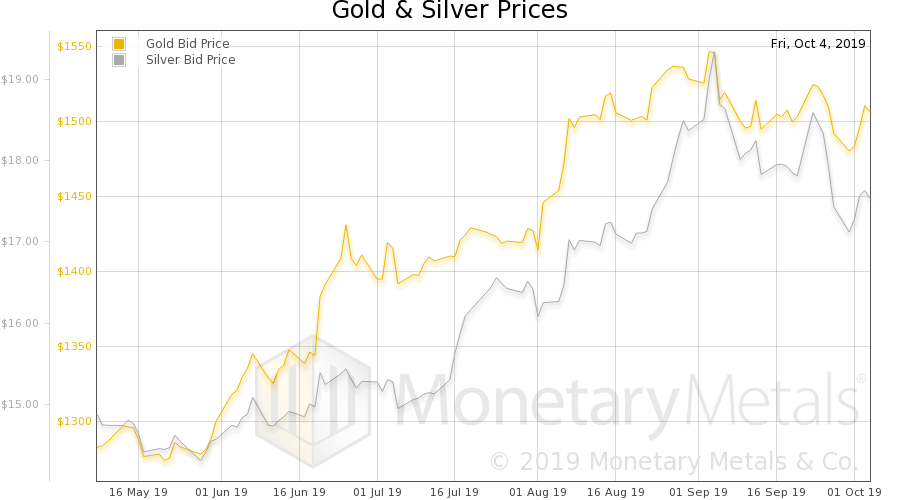 A Wealth Tax Consumes Capital, Report 6 Oct
A Wealth Tax Consumes Capital, Report 6 Oct7 Oct 2019
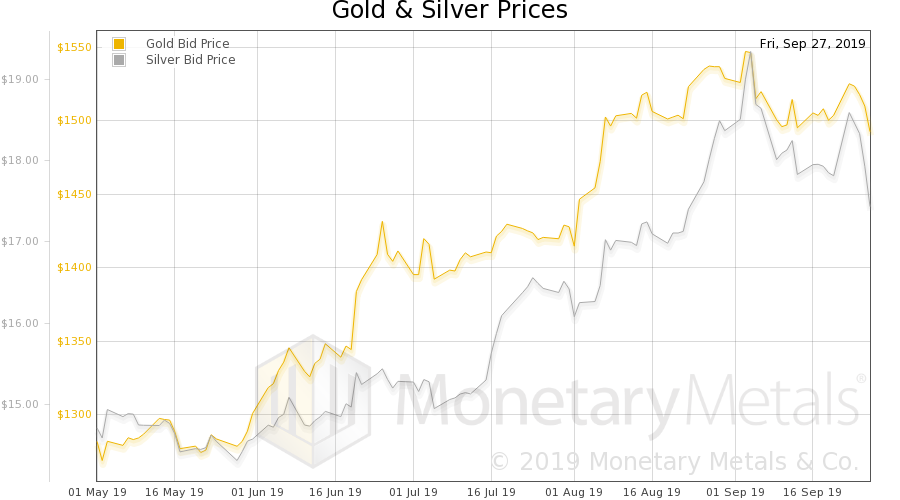 The Purchasing Power of Capital, Report 29 Sep
The Purchasing Power of Capital, Report 29 Sep1 Oct 2019
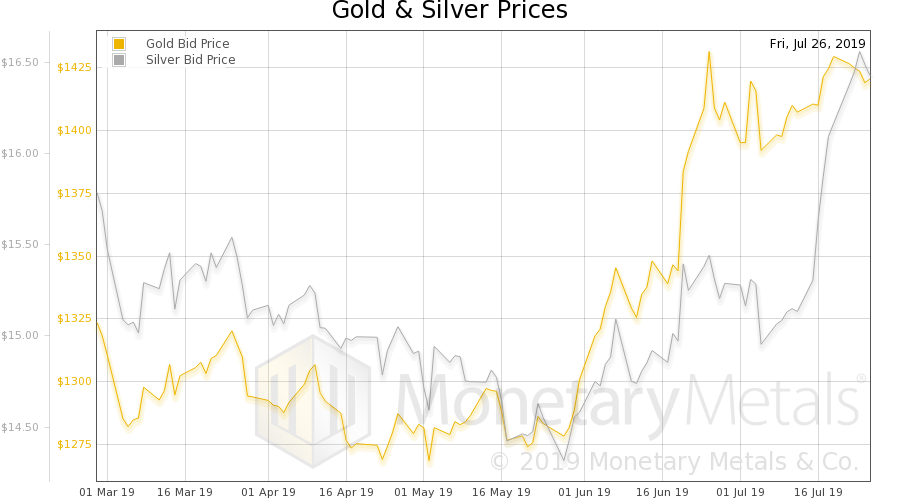 Obvious Capital Consumption, Report 28 Jul
Obvious Capital Consumption, Report 28 Jul30 Jul 2019
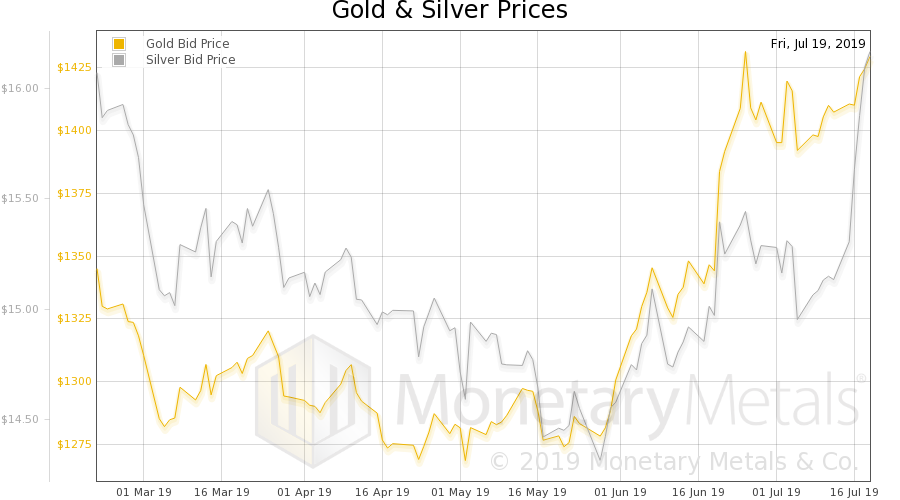 The Fake Economy, Report 21 Jul
The Fake Economy, Report 21 Jul23 Jul 2019
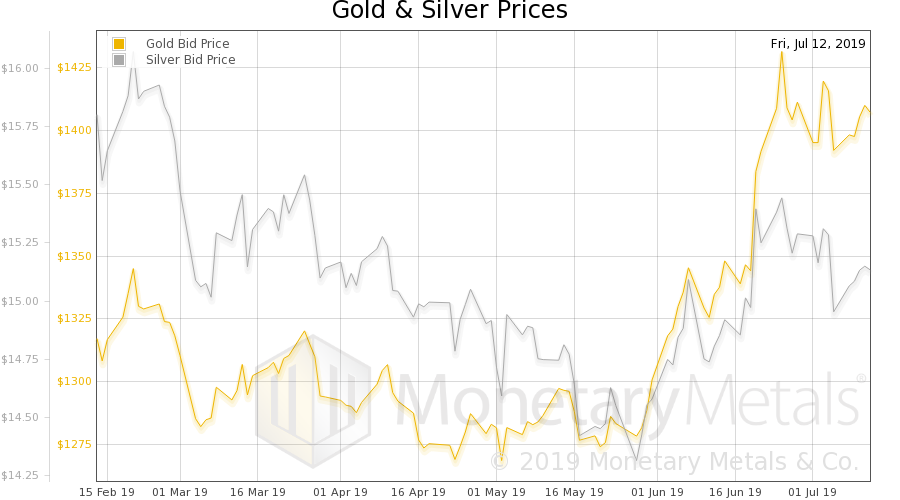 How to Fix GDP, Report 14 Jul
How to Fix GDP, Report 14 Jul16 Jul 2019
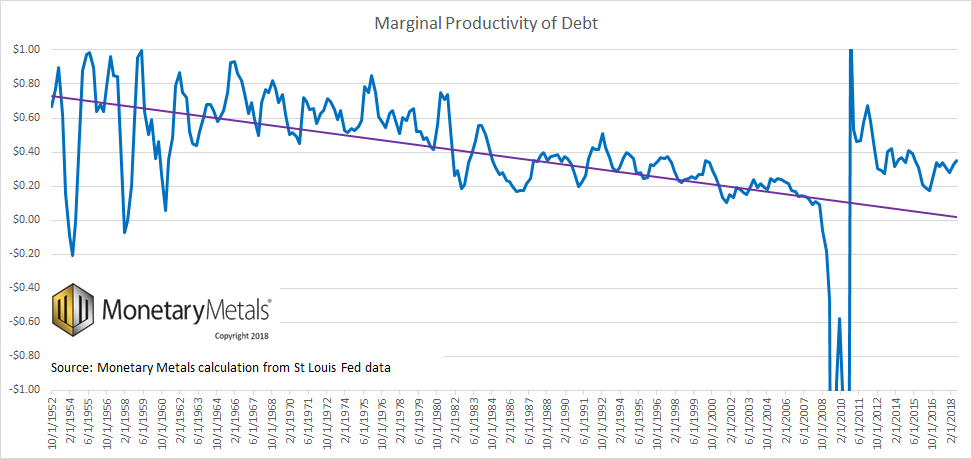 More Squeeze, Less Juice, Report 7 Jul
More Squeeze, Less Juice, Report 7 Jul8 Jul 2019
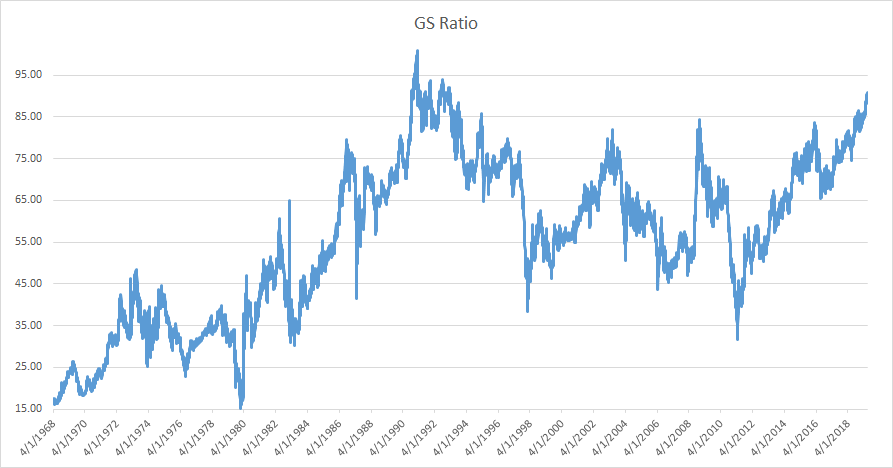 What Gets Measures Gets Improved, Report 23 June
What Gets Measures Gets Improved, Report 23 June25 Jun 2019
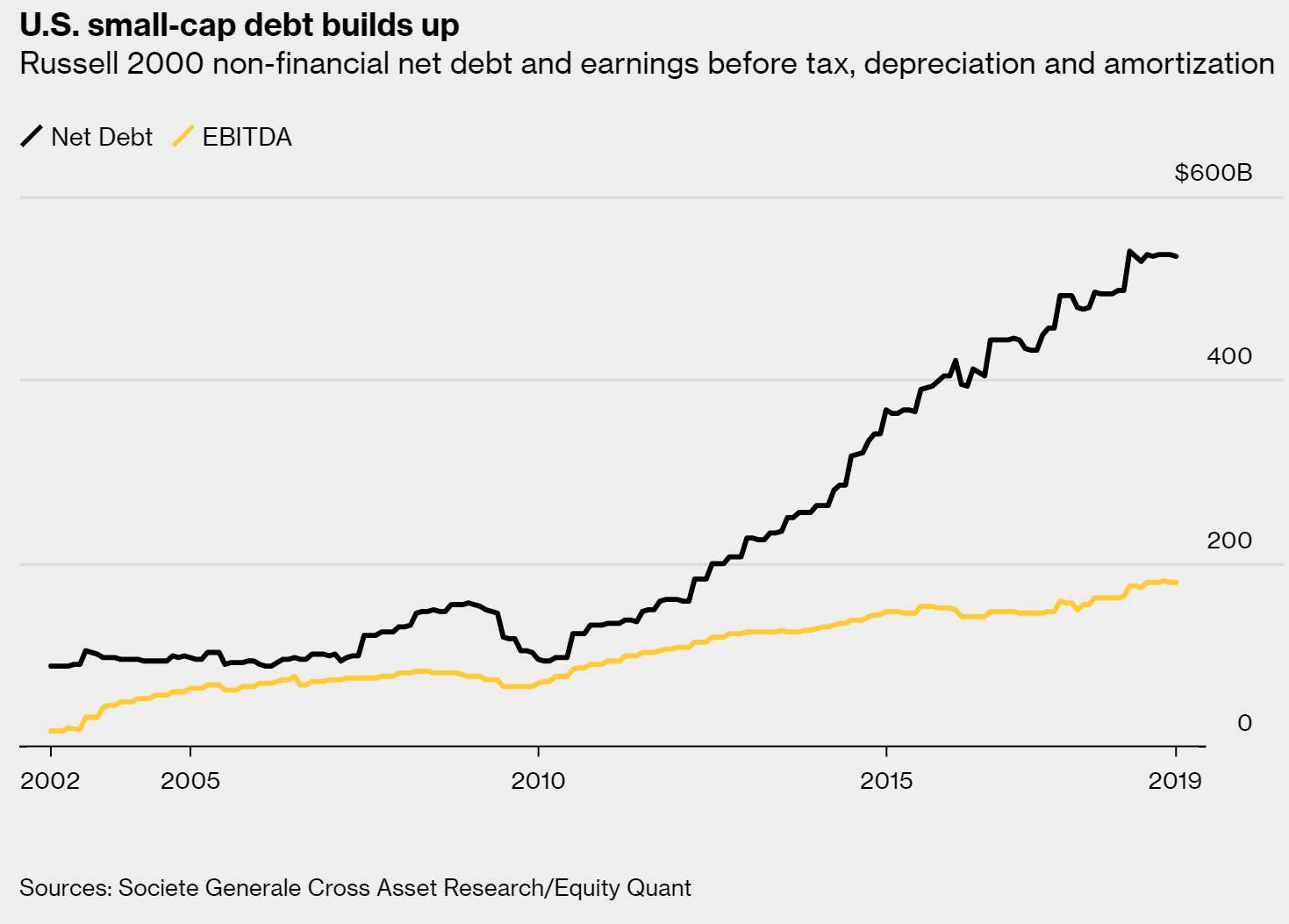 Debt and Profit in Russell 2000 Firms
Debt and Profit in Russell 2000 Firms12 Apr 2019
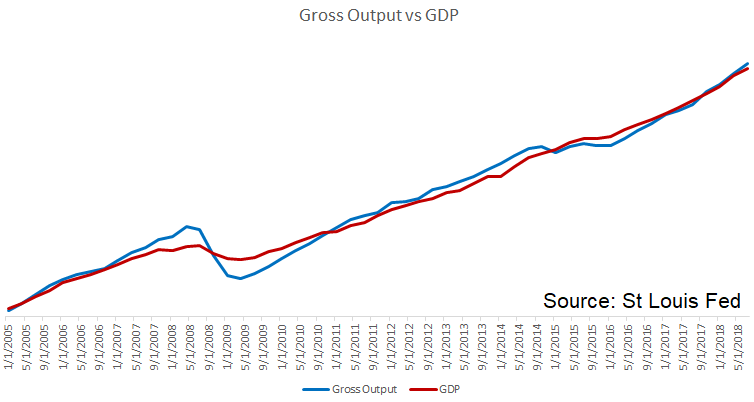 Is Capital Creation Beating Capital Consumption? Report 3 Mar
Is Capital Creation Beating Capital Consumption? Report 3 Mar4 Mar 2019
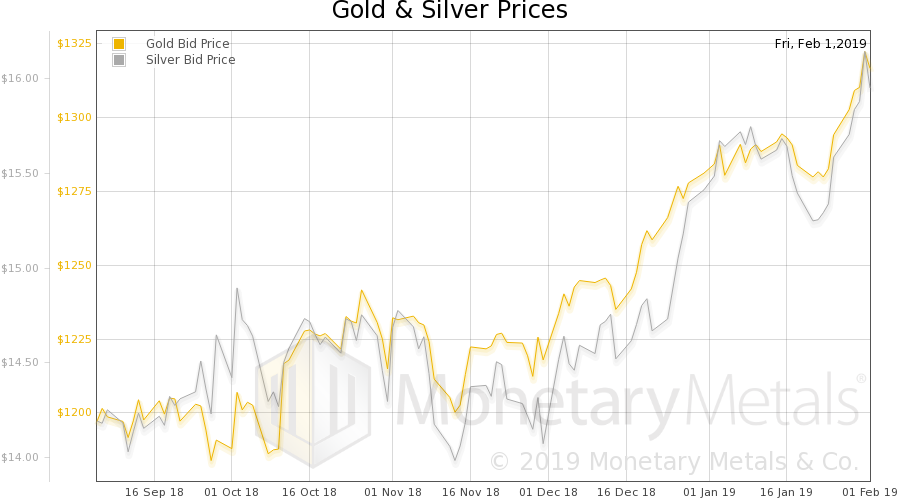 Who Knows the Right Interest Rate, Report 3 Feb 2019
Who Knows the Right Interest Rate, Report 3 Feb 20194 Feb 2019
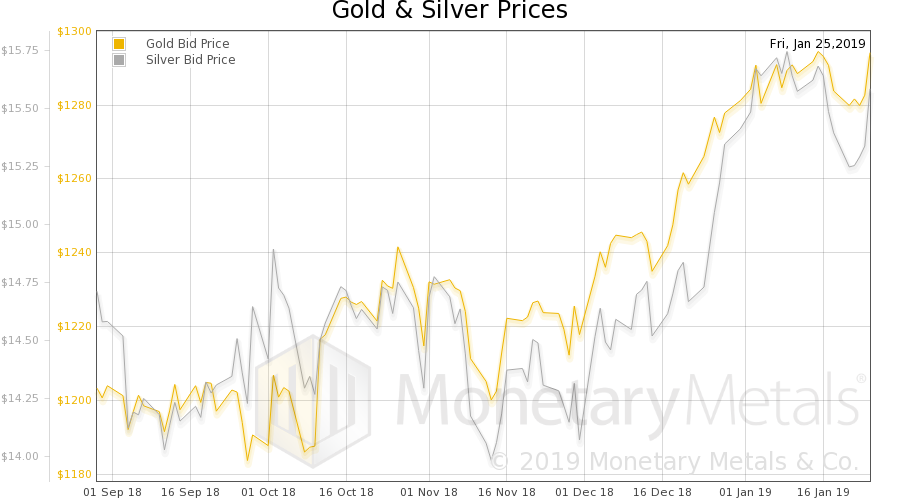 Modern Monetary Theory: A Cargo Cult, Report 20 Jan 2019
Modern Monetary Theory: A Cargo Cult, Report 20 Jan 201928 Jan 2019
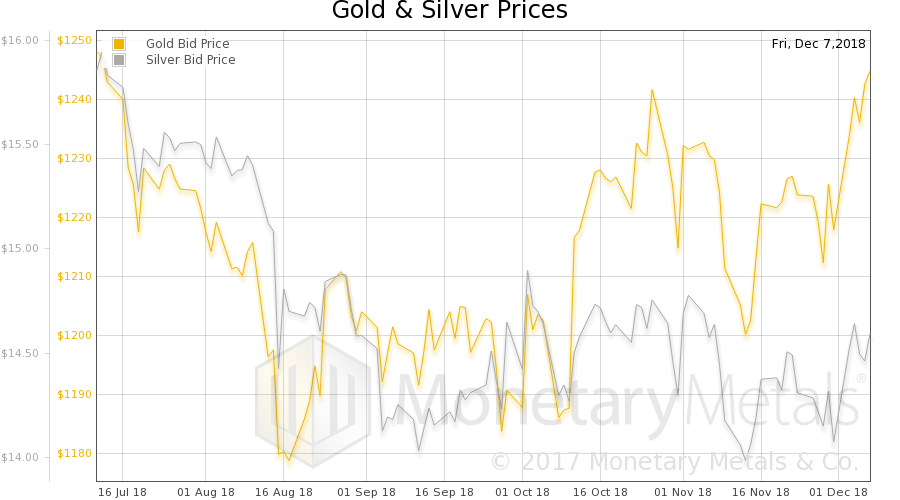 The Prodigal Parent, Report 9 Dec 2018
The Prodigal Parent, Report 9 Dec 201810 Dec 2018
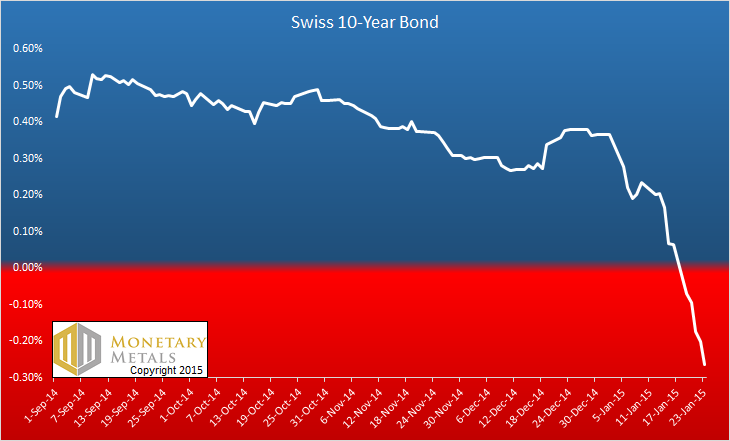 The Toxic Stew, Report 7 Oct 2018
The Toxic Stew, Report 7 Oct 20188 Oct 2018
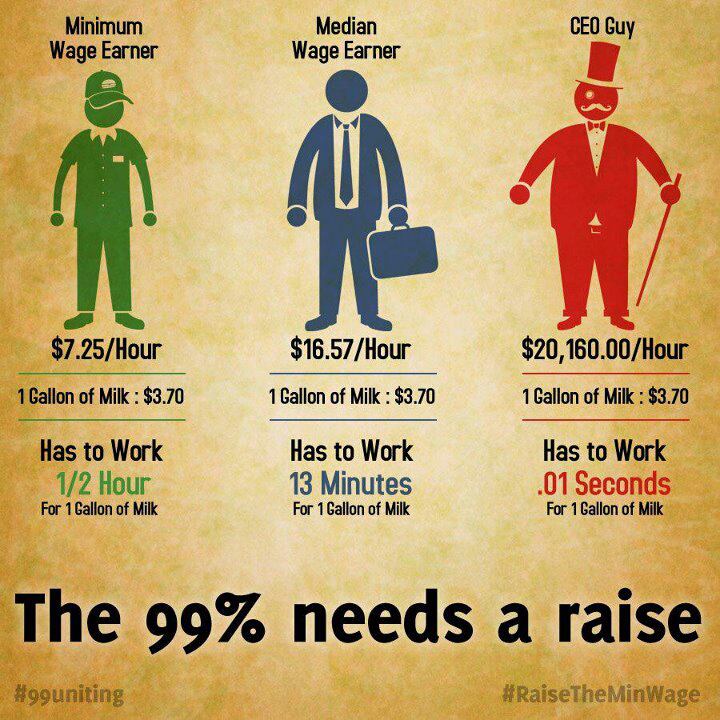 Why Are Wages So Low, Report 23 Sep 2018
Why Are Wages So Low, Report 23 Sep 201825 Sep 2018
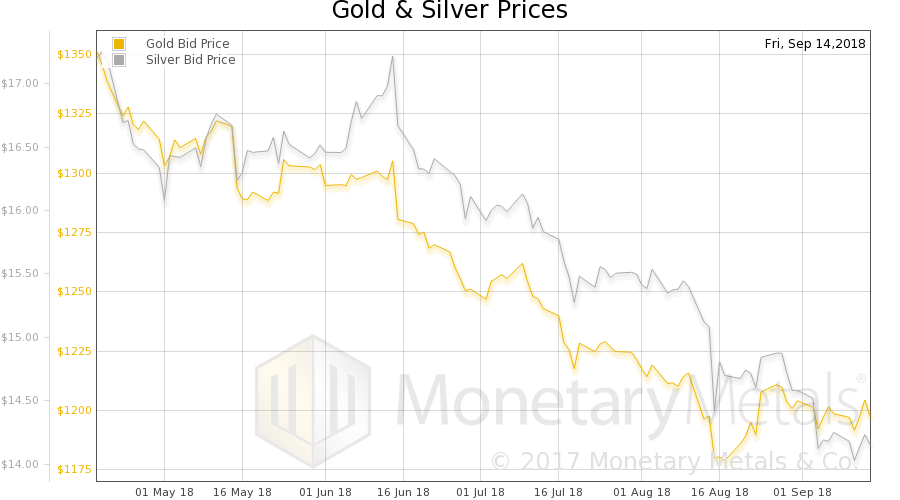 Never Mind the Bollocks, Here’s the Avocado Toast, Report 16 Sep 2018
Never Mind the Bollocks, Here’s the Avocado Toast, Report 16 Sep 201817 Sep 2018









